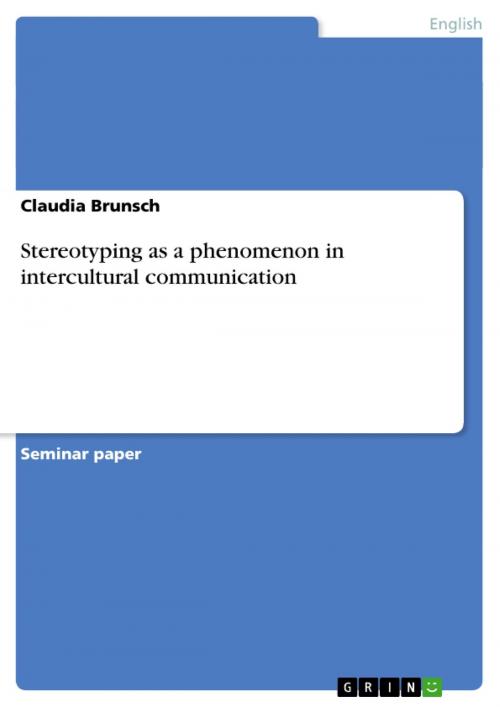Stereotyping as a phenomenon in intercultural communication
Nonfiction, Entertainment, Drama, Anthologies| Author: | Claudia Brunsch | ISBN: | 9783638608183 |
| Publisher: | GRIN Verlag | Publication: | March 9, 2007 |
| Imprint: | GRIN Verlag | Language: | English |
| Author: | Claudia Brunsch |
| ISBN: | 9783638608183 |
| Publisher: | GRIN Verlag |
| Publication: | March 9, 2007 |
| Imprint: | GRIN Verlag |
| Language: | English |
Seminar paper from the year 2005 in the subject English Language and Literature Studies - Linguistics, grade: 1,5, University of Hildesheim (Institut für Angewandte Sprachwissenschaft), course: Intercultural Communication, 9 entries in the bibliography, language: English, abstract: Intercultural communication has become more and more important in a world where everything is becoming global. Few centuries ago, only international managers or diplomats needed to think about intercultural communication and its problems. These days, not exclusively international managers but 'ordinary' people from different cultures come into contact with each other. This phenomenon can be explained due to various reasons: The internet makes it possible to communicate with people from all over the word, modern technologies give people the chance to travel further and faster than ever before. Not only big firms, but also all kinds of organizations act more and more globally instead of locally. The European Union allows people to move to other European countries, to work and to live there. We live in a multicultural society with various cultures. Intercultural communication has become a theme which concerns everybody and which will even become more and more important in our world of globalization where people from all over the world come together and get in contact with each other every day.
Seminar paper from the year 2005 in the subject English Language and Literature Studies - Linguistics, grade: 1,5, University of Hildesheim (Institut für Angewandte Sprachwissenschaft), course: Intercultural Communication, 9 entries in the bibliography, language: English, abstract: Intercultural communication has become more and more important in a world where everything is becoming global. Few centuries ago, only international managers or diplomats needed to think about intercultural communication and its problems. These days, not exclusively international managers but 'ordinary' people from different cultures come into contact with each other. This phenomenon can be explained due to various reasons: The internet makes it possible to communicate with people from all over the word, modern technologies give people the chance to travel further and faster than ever before. Not only big firms, but also all kinds of organizations act more and more globally instead of locally. The European Union allows people to move to other European countries, to work and to live there. We live in a multicultural society with various cultures. Intercultural communication has become a theme which concerns everybody and which will even become more and more important in our world of globalization where people from all over the world come together and get in contact with each other every day.















